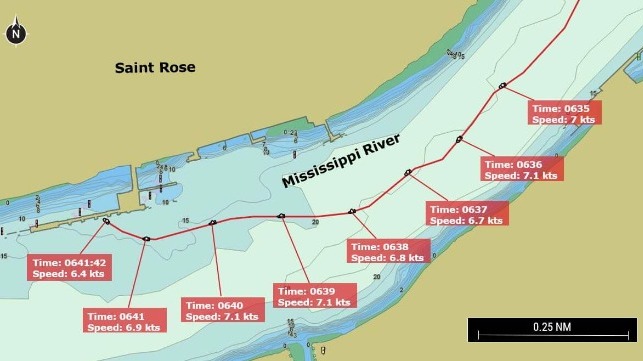NTSB: Acute Sleep Deprivation Led to Towboat Allision

The pilot who was at the helm of the towboat John 3:16 when it hit a cargo pier last year was acutely sleep deprived, according to the National Transportation Safety Board. The agency found that he had had less than six hours of quality sleep in the two days leading up to the casualty.
At about 0600 on Sept. 12, 2023, the John 3:16 was under way near New Orleans carrying out fleeting work, picking up and dropping off barges. The pilot and two deckhands were on watch, and the deckhands were both below in the galley. At about 0636, as the towboat passed the towing vessel Okaloosa, it began to drift to starboard. It continued to veer off course, and it hit the pier of an industrial facility at about 0642. The wheelhouse suffered damage on the starboard side, amounting to about $90,000 in repair work, and the industrial pilings and pipework of the dock sustained about $200,000 worth of damage.
Shortly after the casualty, the pilot told the company port captain that he had fallen asleep on watch. He said that the wheelhouse watch alarm had gone off and woken him, "and there was the dock" ahead as soon as he opened his eyes.

that matters most
Get the latest maritime news delivered to your inbox daily.
The pilot had about 16 years of experience in the towing industry, was properly licensed, and passed drug and alcohol testing. However, he had slept just three hours on Sept. 10 and potentially less on Sept. 11, and had been engaged in hours of phone calls and text conversations on the day before the casualty because of personal stressors. Because the longest period between texts and calls on the 11th was less than two hours, the NTSB concluded that he had had at most two hours of continuous rest that day. He said he did not feel tired when he went on watch at 0000 on Sept. 12.
NTSB noted that fatigue has a pernicious impact on the fatigued individual's ability to recognize that their performance is going down because of sleep deprivation. "Further, self-reporting of fatigue can be hindered by industry or cultural factors that discourage individuals from acknowledging when they are too fatigued to continue operations," the investigators said. "Mariners should understand the performance effects of sleep loss and recognize the dangers of working on board a vessel while fatigued."
